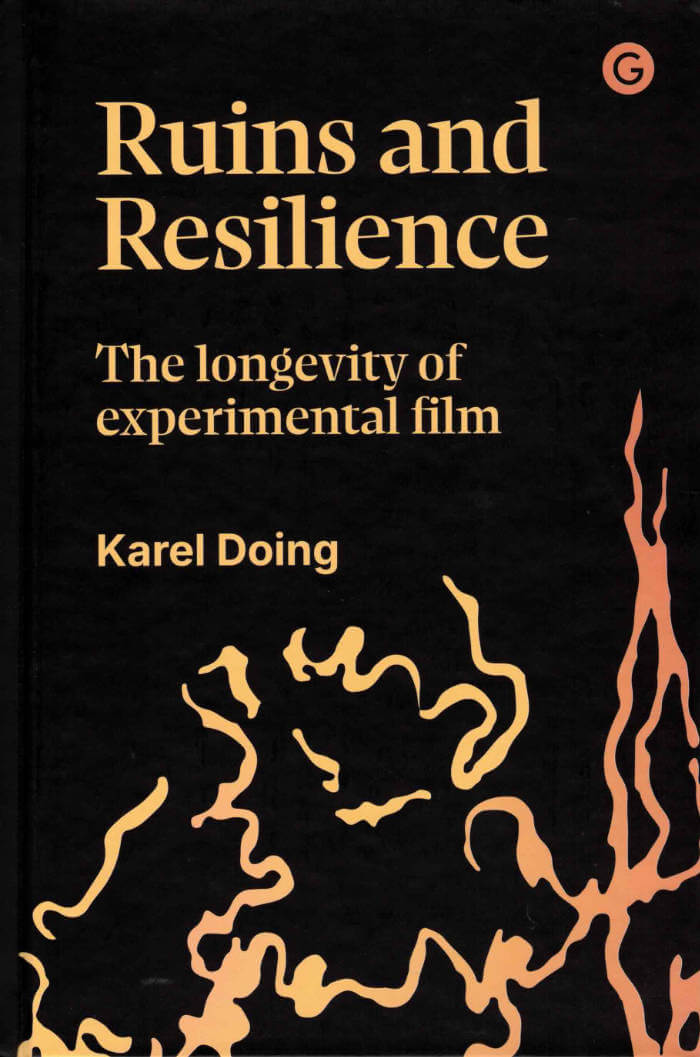Karel Doing
Karel Doing

Ruins and Resilience: The Longevity of Experimental Film
Experimental film practice from an international and transdisciplinary perspective.
Karel Doing is an experimental filmmaker and researcher who has worked across the globe with fellow artists and filmmakers, creating a body of work that is difficult to pinpoint with a simple catchphrase. In Ruins and Resilience he weaves autobiographical elements and critical reviews together with his wide ranging interdisciplinary approach, reflecting on his own practice by positioning key works within the context of a vibrant experimental film scene in Europe, North and South America, and Asia. Doing demonstrates how experimental filmmakers have continued to renew their practice despite the almost total demise of analog motion picture film and the constant neglect of this art form by institutions and critics. Written in a fluent and accessible style, the book looks into the connections between the work of groundbreaking artists within the field and subjects such as transgression, improvisation, collectivity, materiality, phenomenology, and perception. Specifically, intersections with music and sound are investigated, appealing to the idea of the cross-modal brain, the ability to perceive sounds and images in an integrated way. Instead of looking again at the "golden era" of experimental film, the book starts in the 1980s, showing how this art form has never ceased to surprise and inspire. The author's hands-on engagement with the medium is formational for his more theoretical approach and writing, making the book a highly original contribution in the field that is informative and inspiring for academic and practitioners alike.
And more

Scrapbook – 40 ans de Light Cone
A visual anthology compiling the contributions of the filmmakers who are part of the Light Cone collection, a key institution for the distribution, promotion and preservation of experimental cinema in France and around the world, on the occasion of its 40th anniversary.
2022 marks an important moment for Light Cone: its 40th anniversary. Such an event should be celebrated in the best possible way. Light Cone has come together thanks to the filmmakers whose films entered the collection over the years. We've decided to invite them to participate in an editorial project, a book in which we would publish their contributions: letters, postcards, photographs, drawings, film stills, collages, etc., which they have sent us for the occasion of the anniversary. A collective scrapbook in which the materiality of the objects—paper, photos, colors, handwritten notes—evokes that of analog cinema, which we have always defended. A book of images is born, and through the creation of this micro-collection, so is a portable museum of about one hundred pieces, which are ready to be exhibited and which will remain in the care of Light Cone's archive.
With Michel Amarger, Martin Arnold, Caroline Avery, Peter-Conrad Beyer, Giuseppe Boccassini, Patrick Bokanowski, Louise Bourque, Robert Breer, Dietmar Brehm, Claudio Caldini, Stefano Canapa, Abigail Child, Pip Chodorov, Martha Colburn, Philippe Cote, Sandra Davis, Frédérique Devaux, Karel Doing, Anja Dornieden, Flatform, Cécile Fontaine, Olivier Fouchard, Su Friedrich, Siegfried Alexander Fruhauf, Peter Gidal, Milena Gierke, Christoph Girardet, Juan David, Gonzalez Monroy, Christophe Guérin, Nicky Hamlyn, Barbara Hammer, Teo Hernandez, Tony Hill, Mike Hoolboom, Jakobois, Larry Jordan, Patrice Kirchhofer, Maria Kourkouta, Alexandre Larose, Christian Lebrat, Emmanuel Lefrant, Maurice Lemaître, Jeanne Liotta, Rose Lowder, Johann Lurf, Pablo Marín, Mara Mattuschka, Bruce Mcclure, Miles Mckane, Luc Meichler, Barbara Meter, Peter Miller, Matthias Müller, Michel Nedjar, Dominique Noguez, Vivian Ostrovsky, Simon Payne, Emmanuel Piton, Charlotte Pryce, Gisèle Rapp-Meichler, Abraham Ravett, Emily Richardson, D.N. Rodowick, Gaëlle Rouard, Martine Rousset, Pierre Rovere, Ben Russell, Daïchi Saïto, Maki Satake, Sylvia Schedelbauer, Jeff Scher, Stanley Schtinter, Guy Sherwin, José Antonio Sistiaga, John Smith, Vicky Smith, Michael Snow, Malena Szlam, Mika Taanila, Marcelle Thirache, Trinh T. Minh-ha, David Wharry, Telemach Wiesinger, Antoinette Zwirchmayr.

Expanded Nature – Écologies du cinéma expérimental
If it can be said that experimental filmmakers are "expanding" the artistic field through an exploration of the potencies, modes of dissemination, or even performance of the moving image, in the Anthropocene age, these practices hope for another kind of expansion: to expand our experience of nature.
Appending flowers to the film strip or burying it in the ground, inventing observation devices, allowing the camera to be affected by natural forces, engaging one's own filming body in a symbiotic relationship with the environment, reconstituting ecosystems at the moment of projection: the ecologies of experimental cinema presented in this book constitute forms of practice and engagement that awaken a heightened sensitivity to the living world through cooperative links, casting other beings as subjects and agents of filmic processes, and, finally, reshaping the economy of filmmaking. Thus, ecologies of perception, medium, production and multinaturalism are deployed, contributing to the restoration of our sensory bond with the natural world.
Addressing technical, aesthetic and anthropological issues of cinema, Expanded Nature – Écologies du cinéma expérimental (Ecologies of Experimental Cinema) considers how filmmakers and collectives from different parts of the globe form communities with other non-human beings and work through their films to deconstruct human privilege. At the crossroads of disciplines, anthropologists, philosophers, filmmakers and artists, and researchers in visual studies come together and investigate a different history of cinema, written from the point of view of nature.
Texts by Elio Della Noce, Scott MacDonald, Jean-Michel Durafour, Kim Knowles, Philip Hoffman & Janine Marchessault, Karel Doing, Chris Dymond, Alice Leroy, Rose Lowder, Chris Welsby, Yaniv Touati, Bidhan Jacobs, Lucas Murari, Teresa Castro, Colectivo Los Ingrávidos, Elizabeth A. Povinelli, Gérard Leblanc, Frédéric Brayard, Jacques Perconte, Vincent Deville, Lukas Brasiskis & Charlie Hewison.